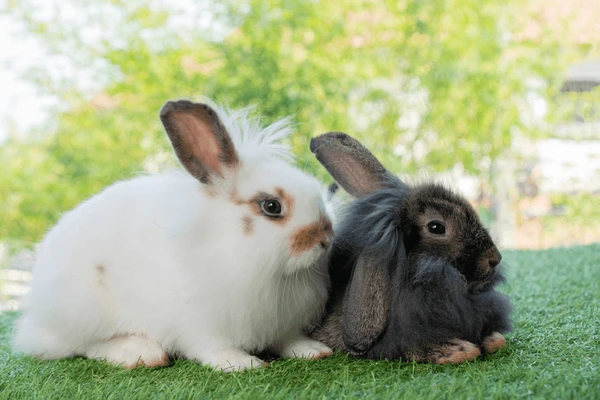
Rabbits are adorable, social, and intelligent creatures that have become increasingly popular as pets. But do rabbits make good pets for everyone? While they can be wonderful companions, they also come with specific care requirements and challenges. This ultimate guide will walk you through everything you need to know about rabbit ownership, from their behavior and diet to housing and health care.So let’s briefly discuss that- Do Rabbits Make Good Pets?
Why Rabbits Make Great Pets
1. Loving and Social Companions
Rabbits are affectionate and enjoy spending time with their owners. With patience and proper bonding, they can recognize their caregivers and seek out attention through nudging, licking, and playful behaviors. They also enjoy interactive play and can develop close relationships with other rabbits or even other household pets when introduced correctly.
2. Quiet and Apartment-Friendly
Unlike dogs and cats, rabbits do not bark or meow, making them an excellent pet choice for apartment dwellers. Their quiet nature allows for a peaceful living environment. However, they do make subtle sounds, such as purring when content or thumping their hind legs when frightened or annoyed.
3. Trainable and Intelligent
Rabbits can be litter trained, learn their names, and even perform tricks with positive reinforcement. Their intelligence makes them highly engaging pets for owners who enjoy interactive playtime and training sessions. They can learn to navigate obstacle courses, respond to commands, and even play simple games, making them much more interactive than many people expect.
4. Long Lifespan
A well-cared-for rabbit can live 8-12 years, or even longer. This makes them a long-term commitment but also a rewarding companion for many years. Their longevity means that owners must be prepared for a decade or more of dedicated care.
5. Low Grooming Needs
Rabbits are self-groomers, requiring minimal bathing. Long-haired breeds need occasional brushing to prevent matting, but overall, they are low-maintenance in terms of hygiene. Regular brushing helps reduce shedding and prevents hairballs, which can cause digestive issues if ingested.
6. Environmentally Friendly Pets
Rabbits are eco-friendly pets that consume fresh vegetables and hay, contributing to a more sustainable pet ownership experience. Their waste can also be composted, and they require fewer manufactured products than traditional pet foods.
Challenges of Rabbit Ownership
1. Special Dietary Requirements
Rabbits require a specific diet to stay healthy:
- Unlimited hay (timothy for adults, alfalfa for young rabbits) for digestion and dental health
- Fresh vegetables daily, including leafy greens and herbs
- Limited pellets to supplement nutrition
- Fresh water always available in a bowl or bottle
- Occasional fruit treats in moderation due to high sugar content
- A poor diet can lead to severe health problems, including digestive issues and obesity. Owners must be diligent about providing a balanced and nutritious diet.
2. Housing and Space Needs
Rabbits need more space than many expect. Ideal housing includes:
- A minimum of 8 square feet of enclosure space per rabbit
- Daily access to a rabbit-proofed room for exercise
- Soft flooring to prevent foot injuries
- A safe and quiet environment, away from loud noises or stressors
- Chew-proof enclosures to prevent destruction of household items
3. Veterinary Care and Health Concerns
Rabbits need specialized veterinary care, including:
- Annual checkups to monitor their health
- Spaying or neutering to prevent reproductive diseases and unwanted litters
- Dental exams, as their teeth grow continuously and require monitoring
- Vaccinations and parasite control to prevent common rabbit illnesses
- Regular monitoring for digestive issues, as rabbits are prone to gastrointestinal stasis
Finding a veterinarian who specializes in rabbits can sometimes be challenging and expensive, making proper preventative care essential.
4. Time and Social Interaction
Contrary to popular belief, rabbits are not low-maintenance pets. They require daily interaction, mental stimulation, and social engagement. Rabbits that do not receive enough attention may become bored or depressed. Owners should spend time with their rabbits daily, allowing them time to explore, play, and interact.
5. Chewing and Digging Behaviors
Rabbits have strong natural instincts to chew and dig. Without proper outlets for these behaviors, they may chew furniture, electrical cords, or carpets. To manage this:
- Provide safe chew toys like untreated wood, hay cubes, or cardboard
- Set up digging boxes filled with shredded paper or soft bedding
- Rabbit-proof the home to prevent damage to valuable household items
6. Introducing Rabbits to Other Pets
Rabbits can coexist with other household pets, but introductions should be done carefully. Since rabbits are prey animals, they may be frightened by dogs or cats. Proper introductions should be slow and supervised, allowing time for all animals to adjust.
Is a Rabbit the Right Pet for You?
Before bringing a rabbit into your home, ask yourself:
- Do I have enough time to provide daily care and interaction?
- Can I afford veterinary expenses, including emergency care?
- Is my home suitable for a rabbit, with enough space and a safe environment?
- Am I willing to commit to a pet that can live for over a decade?
- Do I understand their behavior and needs, including their tendency to chew and dig?
- Can I provide a stimulating environment with proper toys, exercise, and companionship?
If you answered yes, a rabbit could be the perfect pet for you! However, if any of these factors seem overwhelming, consider a different pet that better suits your lifestyle.
Final Thoughts
So, do rabbits make good pets? The answer depends on your level of commitment. Rabbits are affectionate, fun, and intelligent pets, but they also require proper care and attention. If you’re ready to provide them with a loving, well-prepared home, a rabbit can be a wonderful addition to your family.
However, they are not for everyone. Prospective owners should consider their lifestyle, budget, and willingness to commit before adopting a rabbit. With proper care, rabbits can be loving, entertaining, and lifelong companions.




